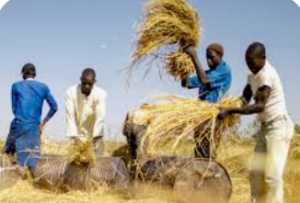How Farming can Serve as Solution to Nigeria’s Famine Crisis: Insights from Tope Fakinlede
How Farming can Serve as Solution to Nigeria’s Famine Crisis: Insights from Tope Fakinlede

Tope Fakinlede
Nigeria is grappling with severe food shortages, impacting millions of its citizens. This comprehensive research, explores the current state of food insecurity in Nigeria, it effects on households and the economy, and offers actionable solutions to revitalize the nation’s farming sector.

Current State of Food Shortages in Nigeria

Food insecurity in Nigeria is a critical issue. According to the World Food Programme, many Nigerians are struggling to access sufficient food, leading to increased malnutrition and economic hardship. The current food shortages are severely affecting the country’s well-being and stability.

Effects on Households

The food crisis has profound effects on Nigerian households. Many families are facing soaring food prices, which erode their purchasing power and strain their finances. This financial burden contributes to malnutrition, particularly among children, and limits access to essential services such as healthcare and education.

Economic Effects
Food shortages have a significant impact on Nigeria’s economy. Rising food prices contribute to inflation, reducing household purchasing power and destabilizing the economy. The agricultural sector, vital to Nigeria’s economy, is suffering from diminished productivity and income, which exacerbates the nation’s financial challenges.

Strengths and Opportunities in Nigerian Farming
Despite these challenges, Nigeria possesses several strengths and opportunities in agriculture:

1. Favorable Climate
– Good Weather: Nigeria’s warm climate and adequate rainfall create ideal conditions for diverse crop cultivation.

2. Large Land Mass
– Extensive Farmland: The country’s vast tracts of arable land provide the potential for substantial food production
 ⇒
⇒
3. Fertile Soil
– Rich Soil: Nigeria’s fertile soil supports a wide range of agricultural activities.
4. Diverse Agricultural Resources
– Variety of Crops: Different climatic zones allow for the cultivation of numerous crops.
5. Growing Market
– Domestic Demand: A large and growing population ensures a significant market for local produce.
6. Investment Potential
– Technology and Innovation: Modern farming technologies can enhance productivity and profitability.
Encouraging Youth and Urban Dwellers to Embrace Farming
For Young People:
– Career Prospects: Farming offers diverse opportunities, from crop production to agribusiness, making it an attractive career choice.
– Technological Advancements: Young people can utilize new technologies to make farming more dynamic and profitable.
For Urban Dwellers:
– Rural Migration: Unemployed individuals in urban areas should consider relocating to rural areas to start farming. This move can provide stable livelihoods and contribute to national food security.
– Community Impact: Engaging in farming can help revitalize rural communities and create local job opportunities.
Challenges Discouraging Farming
Several issues are deterring people from farming:
1. Security Concerns
– Banditry and Violence: States like Benue and Taraba face severe security challenges. Bandits frequently attack farmers, steal livestock, and destroy crops, creating a dangerous environment for agriculture. For instance, Benue State, once known as the “food basket of the nation,” has seen a sharp decline in farming due to pervasive insecurity. This situation has led to soaring food prices and scarcity.
2. Economic and Infrastructural Challenges
– Lack of Infrastructure: Inadequate roads, storage facilities, and transportation networks hinder farmers’ ability to market their produce efficiently, resulting in post-harvest losses.
– Financial Constraints: Limited access to credit and loans prevents many potential farmers from investing in essential resources like seeds and equipment.
3. Land and Resource Management
– Land Ownership Issues: Complex land tenure systems and disputes over land ownership deter investment in farming, undermining confidence in long-term agricultural ventures.
Government Actions to Revitalize Farming
To address these challenges and stimulate interest in farming, the Nigerian government should implement the following strategies:
1. Financial Support for Farmers
– Grants and Loans: Offer low-interest loans and grants to farmers to help them access necessary resources.
– Leasing of Land: Facilitate land leasing options to encourage more individuals to engage in farming.
2. Agricultural Inputs and Support
– Free Fertilizers: Distribute free or subsidized fertilizers and seeds to reduce production costs and boost yields.
– Training and Education: Provide training on modern farming techniques and sustainable practices to enhance productivity.
3. Infrastructure Development
– Improving Infrastructure: Invest in rural infrastructure, including roads and storage facilities, to reduce post-harvest losses and ensure efficient market access.
– Enhancing Irrigation Systems: Develop irrigation systems to mitigate the effects of erratic rainfall and support consistent agricultural output.
4. Export and Market Access
– Facilitating Export: Support farmers in accessing international markets through subsidies and trade agreements to open new revenue streams.
– Market Support: Establish market linkages and cooperatives to help farmers secure better prices and access necessary services.
5. Security Measures
– Combating Banditry: Increase security presence in farming areas, use advanced technology for monitoring, and implement community-based security initiatives.
– Support for Affected Farmers: Provide support and compensation to farmers affected by violence to help them recover and return to farming.
Farming serve as aremedy to famine due to several factors:
1. Increased Food Production: Enhanced farming techniques and technologies can lead to higher yields of crops and livestock, increasing the overall food supply.
2. Diverse Crop Cultivation: Growing a variety of crops reduces the risk of crop failure due to pests, diseases, or adverse weather, ensuring a more stable food supply.
3. Soil Fertility Improvement: Implementing practices such as crop rotation, organic fertilization, and soil conservation can improve soil health and productivity, supporting sustainable food production.
4. Efficient Water Use: Modern irrigation systems and water management techniques can optimize water use, ensuring that crops receive adequate moisture even in dry periods.
5. Local Food Systems: Developing local farming systems reduces dependency on imported food, which can be unreliable during times of crisis or economic instability.
6. Resilience Building: Training farmers in sustainable practices and providing access to resources and technology can enhance their resilience to environmental and economic shocks.
7. Economic Growth: Farming creates jobs and stimulates local economies, which can improve food access and affordability for communities affected by famine.
8. Storage and Preservation: Advances in food storage and preservation techniques can help maintain food supplies and reduce wastage, contributing to long-term food security.
By addressing these areas, farming can play a significant role in alleviating famine and improving food security.
Conclusion
Farming has the potential to address Nigeria’s food security crisis and drive economic development. The country’s favorable climate, extensive land resources, and fertile soil provide a strong foundation for agricultural growth. Overcoming current challenges requires concerted efforts from the government, communities, and individuals.
The government must play a proactive role in financing agriculture, improving infrastructure, and ensuring security. By addressing these issues, Nigeria can transform its agricultural sector, encourage youth involvement, and provide opportunities for urban dwellers to engage in farming.
With dedicated efforts and strategic interventions, Nigeria can overcome its food insecurity challenges and pave the way for a more prosperous future.
TRENDING SONGS
 Trending Video: Muslim Man Joins Wife in Hallelujah Challenge ‘Dress Like Your Miracle’ Night
Trending Video: Muslim Man Joins Wife in Hallelujah Challenge ‘Dress Like Your Miracle’ Night
 Woman Seeks Advice as Late Brother’s Wife Refuses to Mourn Him Following His Death With Alleged Mistress
Woman Seeks Advice as Late Brother’s Wife Refuses to Mourn Him Following His Death With Alleged Mistress
 Nobody Cares About Fine Girls In The UK, I Miss Nigeria — Nigerian Lady Laments
Nobody Cares About Fine Girls In The UK, I Miss Nigeria — Nigerian Lady Laments
 Wedding Called Off: How Lady Cancels Wedding After Finding Out Finance’s Affairs With Her Bestie
Wedding Called Off: How Lady Cancels Wedding After Finding Out Finance’s Affairs With Her Bestie
 Heartbreak in Ikeja: Lady Weeps After Fufu Found in New Phone Package
Heartbreak in Ikeja: Lady Weeps After Fufu Found in New Phone Package
 Twist of Fate: Man Who Questioned Phyna’s ₦1Billion Demand Mourns Brother in Dangote Truck Crash
Twist of Fate: Man Who Questioned Phyna’s ₦1Billion Demand Mourns Brother in Dangote Truck Crash
 Tragedy in Enugu: Dangote Truck Claims Lives of Family of Five
Tragedy in Enugu: Dangote Truck Claims Lives of Family of Five
 Bangkok Crackdown: Nigerian-Thai Couple in Police Net Over Drug Trafficking
Bangkok Crackdown: Nigerian-Thai Couple in Police Net Over Drug Trafficking
 Family Rift: Reno Omokri’s Ex-Wife Says He Deserted Their Special Needs Son
Family Rift: Reno Omokri’s Ex-Wife Says He Deserted Their Special Needs Son
 The Man Who Sent Money for Two Decades, Only to Return to an Empty Shell
The Man Who Sent Money for Two Decades, Only to Return to an Empty Shell
Share this post with your friends on ![]()













